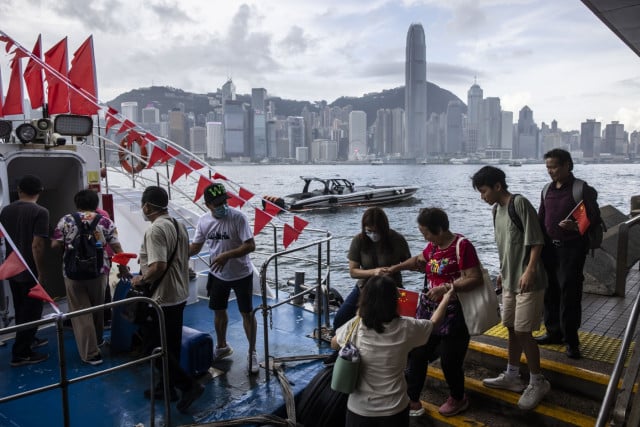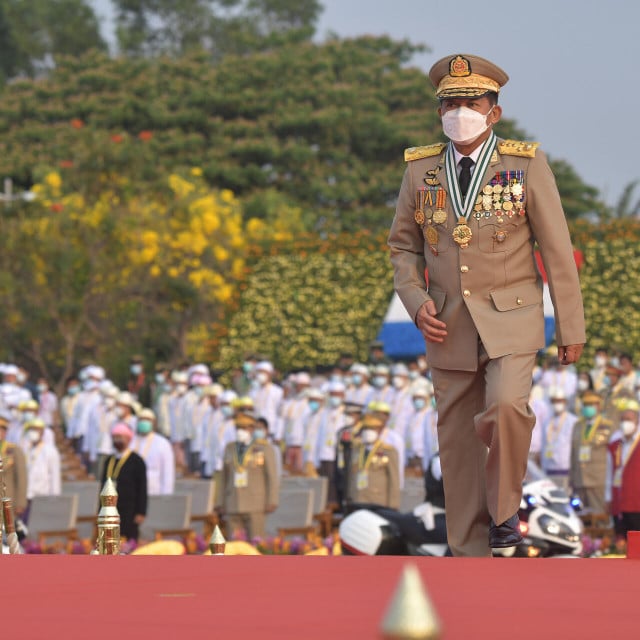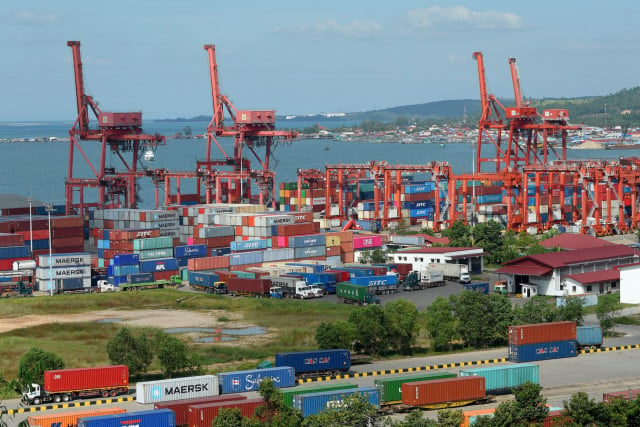Hong Kong: a turbulent road since the handover

- By Agence France-Presse (AFP)
- July 1, 2023 12:49 PM
Hong Kong, China - Hong Kong has had a turbulent history since it was handed over from Britain to China 25 years ago.
Here are some key dates:
- 1997: the handover -
On July 1, 1997, at midnight, Hong Kong is returned to Chinese sovereignty after 156 years of British rule.
The tiny territory has its own mini-constitution that governs its autonomy as a Special Administrative Region within China. Beijing promises a "One Country, Two Systems" approach to the territory, meaning it will maintain freedoms that are not available to mainland Chinese.
The city is governed by a chief executive, chosen by a Beijing-controlled committee. Laws are passed by a legislative council, of which a minority of members are democratically elected.
- Financial, then health crisis -
In October 1997, just months after the handover, the Asian financial crisis grips Hong Kong, plunging the banking hub into an economic slowdown.
Five years later, a pneumonia-like virus named Severe Acute Respiratory Syndrome (SARS) kills 299 people in Hong Kong and 1,800 worldwide, devastating Asian economies.
- 2003: China steps in, national security bill -
Beijing seeks to relaunch Hong Kong's economy, moving in 2003 to gradually lift customs barriers on Hong Kong products exported to the mainland.
Travel restrictions on Chinese from the mainland are eased, boosting tourism numbers.
In July 2003, an unprecedented half a million of Hong Kong's population of seven million march against an unpopular national security bill, which they see as an attempt by Beijing to restrict their freedoms.
The bill is subsequently dropped -- a rare government climbdown.
- 2004: Calls for more democracy -
In January 2004, 100,000 people march through the city calling for more democracy, bringing to a head a simmering row over the constitution's lack of clarity on electing lawmakers. China in April rules out a swift change.
In July, hundreds of thousands of protesters again come out to demand more democracy.
- 2007: Universal suffrage promised -
In 2007, Beijing schedules for 2017 the first democratic election of the chief executive, and for 2020 elections to the legislative council.
The promises disappoint pro-democracy demonstrators who were demanding universal suffrage from 2012.
- 2014: Umbrella Movement -
In 2014, Beijing proposes a limited version of universal suffrage -- Hong Kongers will be able to choose from a small group of Beijing-vetted candidates.
The announcement sparks a 79-day occupation of major thoroughfares known as the "Umbrella Movement".
The protesters secure no concessions from Beijing, an outcome that prompts a minority of protesters in subsequent years to harden their positions, including advocating Hong Kong's independence.
- 2019: Massive protests -
In 2019, the Hong Kong government tries to fast-track a bill through the legislature that would allow extraditions to China's Communist Party-controlled courts.
The move sparks the biggest protests Hong Kong has witnessed since the handover.
Millions take to the streets during seven months of unrest while a smaller section of hardcore protesters frequently battle police in often-violent confrontations that see thousands arrested.
The movement soon morphs into a new call for democracy and police accountability but is eventually suppressed.
- 2020: Covid-19 hits -
In January 2020, Hong Kong is one of the first territories to be affected by the coronavirus epidemic.
The executive takes drastic measures, including a ban on public gatherings, effectively ending the pro-democracy demonstrations.
- 2020: National Security Law -
In June 2020, Beijing passes a national security law for Hong Kong, bypassing the local legislature.
China's security agencies will be able to operate publicly in the city for the first time.
Beijing will have jurisdiction over some cases, toppling the legal firewall that has existed between Hong Kong and mainland courts.
Calls for independence or greater autonomy are banned.
The move sees most pro-democracy leaders either jailed, giving up politics or fleeing abroad.
Several countries say the law has ended the principle of "One Country, Two Systems" approach, which was supposed to be in place until 2047.
- 2021: Electoral reform -
In March 2021, China approves a radical "patriots only" reform of the electoral system, which completely sidelines the opposition.
Under the new rules, only those deemed politically loyal can stand for office, and it drastically curtails the number of directly elected seats.
- 2022: Xi visits -
Chinese leader Xi Jinping visits Hong Kong for the 25th anniversary of the handover, the halfway point of the 50-year transitionary governance model.
He praises the "One Country, Two Systems" model, saying there is "no reason at all to change and it must be upheld in the long run".
Hong Kong's former security chief John Lee, who oversaw the clampdown on the pro-democracy movement, is sworn in as the city's new leader following a selection process where he faces no rivals.
bur-dhc/aha/cwl
© Agence France-Presse















